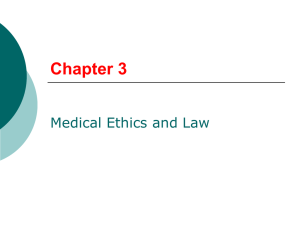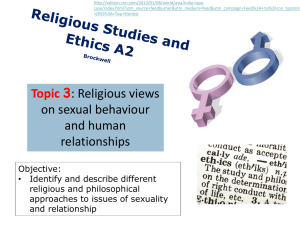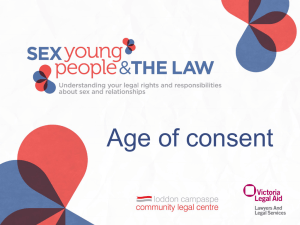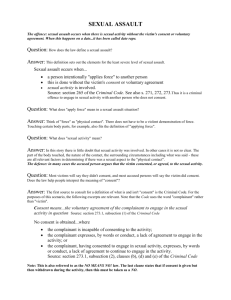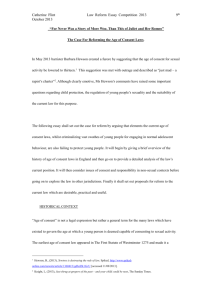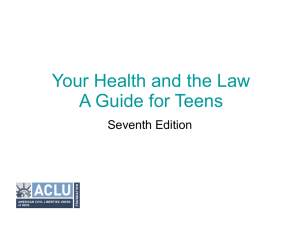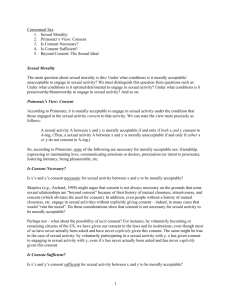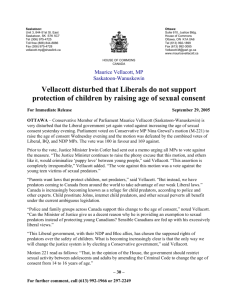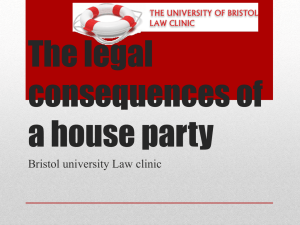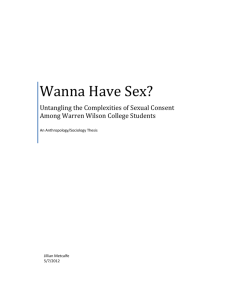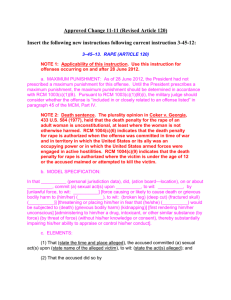Capacity, Consent and the Law Relating to
advertisement
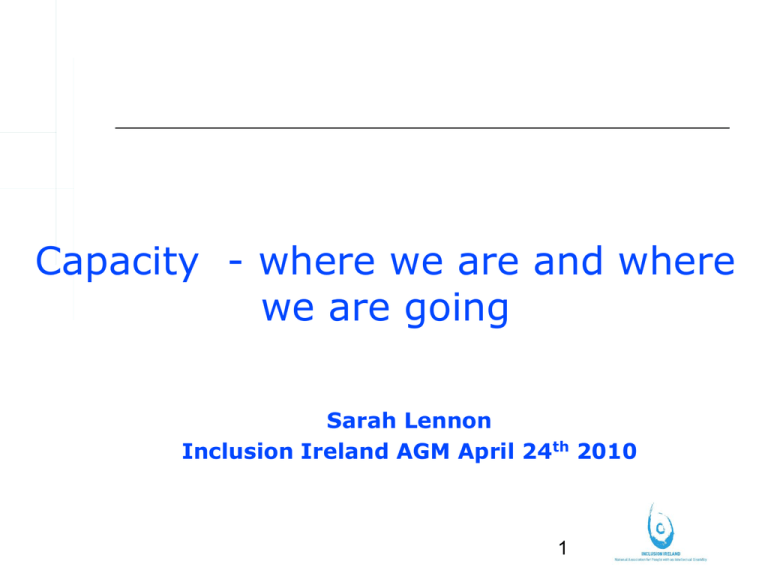
Capacity - where we are and where we are going Sarah Lennon Inclusion Ireland AGM April 24th 2010 1 Capacity – Why does it matter It goes to the heart of many areas of a person's life Marriage Medical consent Sexual relationsips Voting Financial Matters Contracts Wills 2 Capacity – Why does it matter “A finding that a person lacks capacity results in the restriction or removal of fundamental human rights” – Law Reform Commission Report; The Law & The Elderly 2003 As with Every Human Right it should only be restricticed as a last resort and it should always be presumed that a person has capacity to make decisions. 3 Defining Capacity The ability or power to do something. In the case of Intellectual Disabililty – decision making 4 Defining Capacity An individual’s full legal capacity is fully recognised if they can demonstrate to others their will and intent. Competency is attached to the decision making process, and not to the person - Michael Bach Canadian Association for Community Living 5 Defining Capacity “ It is not people who are competent, it is decisions that are competent. There is no such thing as being existentially competent. Once you can have decision-making capacity over anything, the competence is related to the decisions.” - John Harris Professor of Bioethics at the University of Manchester 6 Current Irish Law 1871 Lunacy Regulation (Ireland) Act In the context of laws in the UK that gave mentally ill people the status of patients not prisoners UK has had several revisions and currently has Mental Capacity and Mental Health Laws Ireland still under 1871 Act for Mental Capacity issues 7 Current Irish Law – Status Approach Lunacy Act – Ward of Court Where an individual is given the “status” of lacking capacity. An example would be age of consent (17 in Ireland) 8 Capacity – Functional Approach The Law Reform Commission (LRC) has recommended a functional approach to assessing capacity on an ‘issue-specific’ basis This means that a person’s capacity to make a decision on one particular issue (e.g. making a will) will not be looked at in the same way as another issue (e.g. marriage) 9 In Practice: sexual relationships It is an offence to have or attempt to have sexual intercourse with a person who is “mentally impaired” unless they are married. Section 5.1 1993 Criminal Law (Sexual Offences) Act Mentally impaired is defined as “Suffering from a disorder of the mind, whether through mental handicap or mental illness, which is of such a nature or degree as to render a person incapable of living an independent life or of guarding against serious exploitation.” 10 In Practice: sexual relationships It is worth noting that this does not apply to married couples Laura Kelly Case – showed limitations of law and difficulties posed by lack of capacity legislation 11 Law Reform Commission “a regrettable effect of section 5 of the 1993 Act is that outside a marriage context a sexual relationship between two ‘mentally impaired’ persons may constitute a criminal offence because there is no provision for consent as a defence in respect of a relationship between adults who were both capable of giving a real consent to sexual intercourse.” some degree of dependence would not necessarily preclude an ability to consent Law reform Commission Consultation Paper on Capacity 12 In Practice:Medical Treatment Consent is always required Medical council have created guidelines – capacity must be presumed Disability does not necessarily mean lack of capacity A patient is entitled to be accompanied by an advocate of their own choice 13 In Practice:Medical Treatment Capacity: Functional Approach Assess the ability to understand and remember information and apply it to their own situation If capacity is deemed lacking then the should consult parents, guardians or carers 14 In Practice:Medical Treatment Acting without consent from the person: Doctor is ultimately responsible Will look at best clinical procedure, past / present wishes if known, views of people who may know individual's preferences or values and views of other health care professionals 15 Proposed New Law We have obligations on us: - Constitutional right to privacy - ECHR, right to a private family life - UN Convention on rights of persons with disabilities, right to enjoy capacity on an equal basis with others. Respect for family life. State parties must promote these things 16 Capacity Bill 2008 Definition of capacity Presumption of capacity Personal guardians on particular issues Excludes – marriage (civil partnership), separation, dissolution and divorce, consent to adoption, sexual relationships, voting and membership of a jury 17 Capacity Bill 2008 Court of Care and Protection – High Court Law Reform Commission suggested a triubunal “Any act done or decision made under this Act for or on behalf of a person who lacks capacity must be done or made in his or her best interests”. 18 Other Countries:UK UK – Metal Capacity Act Court of Protection – Specialist Court, specially trained judges Code of Practice. Similar planned for development in Ireland http://www.publicguardian.gov.uk/mca/code-of-practice.htm 19 Other Countries:Canada A system of supported decision making is in place. Most advanced in British Columbia. An individual with a disability can enter a “representation agreement” with a support network. The agreement is a sign to others, including doctors, financial institutions and service providers, that the individual has given the network the authority to assist him/her in making decisions and represent him/her in certain matters 20 Thank You Questions? 21




